BBC Sport Scotland's Scottish football review 2014
- Published
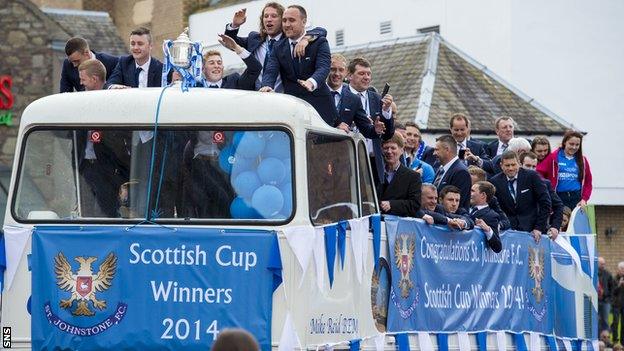
St Johnstone celebrate winning the Scottish Cup, their first major trophy in 130 years
The year in Scottish football saw corporate as well as competitive drama and upheaval, certainly, but also the usual doses of joy and sorrow.
Individual stories abound, but there were prominent themes, too, not least some clubs shedding debt and others finding youth development and prudence to be worthwhile pursuits.
Subjectivity applies to any review, but events can be judged on their own merits. Every club will, for instance, have seen significant moments, but those that linger tend to have generated a wider impact.
There were familiar travails at Ibrox, both on and off the field, but also the growing success of the women's game, as reflected in the progress of the Scottish national team and Glasgow City's European exploits.
Changing of the guard
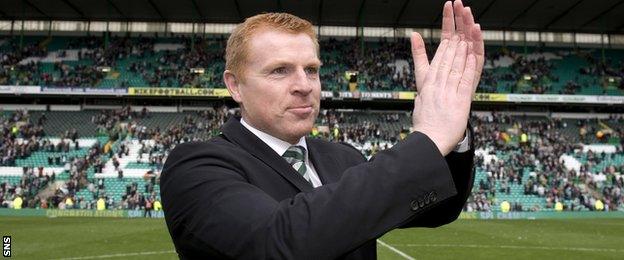
Celtic won 99 league points in Neil Lennon's final season in charge
Managers came and went, as they always do, but there were two departures that dominated the year. The fate of Ally McCoist at Ibrox will be folded into the single narrative of Rangers, but Neil Lennon's decision to leave Celtic was a neat turning point in the year. His Celtic side won their third consecutive title in emphatic style - securing the championship on 26 March.
Lennon's team lost only once in the league all season, they scored 102 goals and accumulated 99 points. The tallies alone are testament to his ability to motivate and drive his players on. There was a sense when Lennon decided to leave, though, that he felt the team was downsizing and that he felt it was the right time to move on.
The pursuit of a new manager was played out in the full glare of the media. Candidates were identified and assessed, and for a time it seemed certain that Roy Keane would take the position. Instead, the Norwegian Ronny Deila was named as Lennon's successor, a young, self-assured, contemporary manager who had guided Stromsgodset to achievements beyond their usual ambitions.
Deila spoke of player development, of style and philosophy, but he also seemed aware of the need for substance, too. Clubs like Celtic do not tolerate long spells of transition, and early European obligations brought challenges that revealed the balance Delia had to strike between working with the resources that he had and trying to implement his own playing strategies.
Celtic have found a sense of rhythm now, but it is not yet as decisive or capable of flourishes as the one that Lennon's side produced. Deila is still shaping the team, but he only has to look back to last May and the achievement of his predecessor to see what is expected of a Celtic manager.
The Rangers saga continues
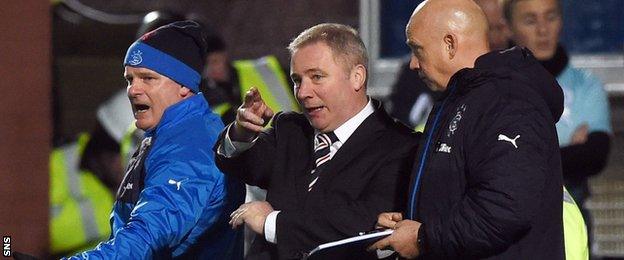
Ally McCoist is now on "gardening leave" from Rangers, while Kenny McDowall (right) takes over the first team and Ian Durrant (left) looks after the under-20s
McCoist's decision to resign and invoke a 12-month notice period was a sudden dramatic intervention at Ibrox, but not out of keeping with another year of intrigue. Performances on the field did not improve greatly, yet there was a certain grim determination in the way that the players maintained their unbeaten league campaign to win the League One title.
The backdrop tends to be more interesting at Rangers than events on the pitch, though. Supporters continued to grow disenfranchised with the board and the group of shareholders who run the club.
When Dave King, the former director, urged fans to pool their season ticket money, the result was that 15,000 refused to renew during the summer. The drop-off was a reflection of the disengagement of fans who are unhappy at the way the club is being controlled, but also brought financial consequences.
Loans had to be sought in February and October, just to keep the business running, while an open offer of shares in September also raised a little over £3m. The annual accounts revealed that a further £8m is required in fresh funding next year, and in the background Mike Ashley, the owner of Newcastle, has been building his power base.
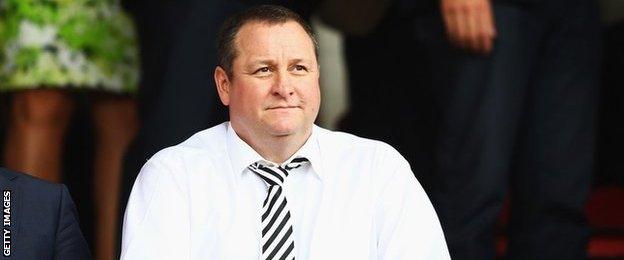
The Scottish Football Association announced on Christmas Eve that it had rejected Mike Ashley's bid to increase his stake in Rangers
He did not participate in the open offer, but did buy shares in the open market, so that he now owns 8.92% of Rangers International Football Club. With the open offer not raising enough, Ashley also offered a loan, although King and fellow supporters made a £16m funding offer - which the board rejected citing proof of funding queries which the consortium denied was an issue - and Brian Kennedy also made a loan offer.
Among the conditions of Ashley's £3m loan was that he have two representatives on the board, despite having agreed in an undertaking with the Scottish Football Association not to have undue representation on the board. His long-time associate and former Newcastle United managing director, Derek Llambias, is now chief executive. After 12 months of further intrigue and machinations, Rangers still need money, better governance and a more stable ownership structure.
Triumphs and agonies
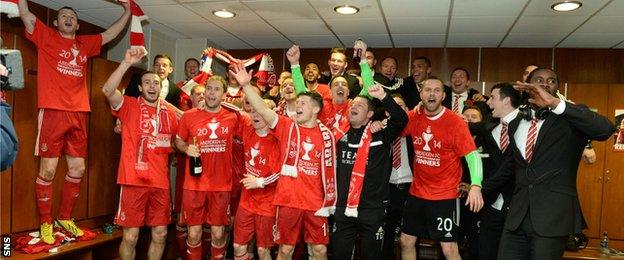
Aberdeen look like a team on the up under manager Derek McInnes
Aberdeen fans will still revel in the memories of winning the League Cup final in March by defeating Inverness Caledonian Thistle on penalties. The city celebrated like it had done in the past, but the victory was also further evidence that Derek McInnes is developing into a fine manager with strong values and ambition, and an individual who might yet re-establish Aberdeen's credentials at the upper end of the Scottish game.
St Johnstone won the Scottish Cup - their first major trophy in 130 years - by defeating Dundee United, while Raith Rovers won the Ramsdens Cup, external by defeating Rangers at Easter Road. Yet Hearts could not halt their slide towards the Championship, having been docked points for Heart of Midlothian Football Club plc going into administration.
They were joined in the Championship by Hibernian, after Terry Butcher's attempt to bring sweeping change to the club merely alienated some players and led to a decline in performances that sent Hibs into the play-offs. Even a 2-0 win in the first leg of the final against Hamilton was not enough, since Hibs lost the second leg 2-0 at Easter Road and were relegated on penalties.
Morton were relegated from the Championship while East Fife and Arbroath both dropped out of League One. They were replaced by the League Two champions Peterhead, and Stirling Albion, who rose through the play-offs.
This season has seen strong starts by Hearts, who are 12 points clear in the Championship and Arbroath, who lead League Two, while Aberdeen and Dundee United are applying some pressure to Celtic in the top flight.
Finances and youth
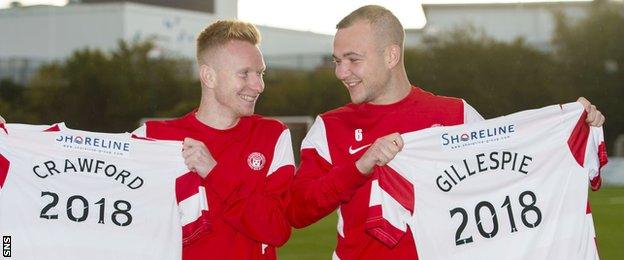
Hamilton duo Ali Crawford and Grant Gillespie helped the Accies to the top of the Scottish Premiership for a spell
In different ways, Dunfermline, Kilmarnock, Dundee United, Aberdeen and, soon, Hibernian have shed their debt to Lloyds Bank. The result of various different deals, some of which have included new money going into the clubs as well as new figures in the boardrooms, allows them to invest their income in the team and the club, rather than using it to service debt,
There is no sudden change of circumstances for the clubs, though, since they still need to live within their means. Wages need to be kept at a manageable level, and transfer fees will not be paid, but there is an opportunity now for them to rebuild from a stronger base.
Good examples are available. Hamilton rose out of the Championship by overcoming Hibernian in the play-offs, and they have retained their commitment to youth development and being a community-focused club. They did not sign a job lot of seasoned professionals with top-flight experience, but instead trusted in the players who took them up.
The reward was consistency, a brief spell at the top of the Premiership and a story that grabbed the attention of the football community. The progress of players like Ali Crawford, Ziggy Gordon, Darian McKinnon, Stephen Hendrie and Grant Gillespie is testament to the worth of the club's strategy.
Dundee have impressed, too, having reacted to winning the Championship by signing some players with top-flight experience, but the club is also committed to developing their own talent.
Making progress - the national team
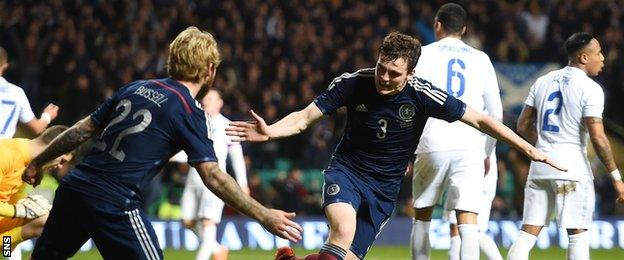
Andrew Robertson celebrates scoring against England in the defeat at Celtic Park
Scotland won three of their seven games this year, drawing two more and only losing to Germany and England. Optimism abounds, since Gordon Strachan is proving a canny and effective manager.
The team has been organised and well-drilled, but also resourceful. Strachan has sought to maximise the attacking intent of players such as Steven Naismith, Shaun Maloney and Ikechi Anya, but also ensure that Scotland are not easily over-run.
The swift development of young players such as Andrew Robertson, who made a seamless transition from playing for Dundee United to turning out in the English Premier League with Hull City, also bodes well.
There are always awkward moments in qualifying campaigns, but defeating Georgia at home showed that Scotland are capable of grinding out difficult victories. The same could be said of the win over the Republic of Ireland, only because Scotland's impressiveness during the game could not be certain to deliver the victory; the team needed an element of conviction.
Poland's equaliser in a 2-2 draw in Warsaw will still rankle, but otherwise the team is well placed going into next year. Wins will be required in the games at Hampden, but a victory in Dublin could potentially be critical. Strachan has restored hope, and that has always been a valuable commodity.
Enduring success - the women's game
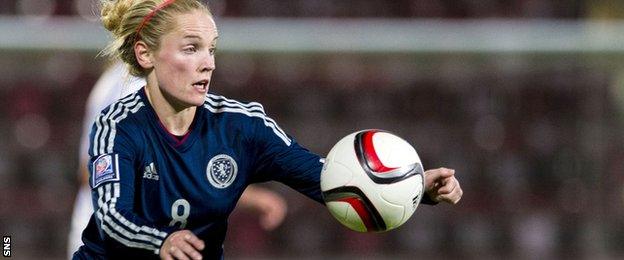
Scotland and Seattle Reign's Kim Little won the National Women's Soccer League's most valuable player award for the 2014 season
Glasgow City have made a habit of pushing the boundaries of the women's game in Scotland. They have long impressed at domestic level, but in November they reached the quarter-finals of the Champions League for the first time, also becoming the first Scottish club to reach that stage. They will face Paris St-Germain in March.
The international team reached the World Cup qualifying play-offs only to come up against a strong and talented Dutch side. There was disappointment that the promise of so much of the campaign could not be realised in the end, but the growth in interest and coverage of the women's game has been facilitated by the increasingly impressive performances of the national and domestic sides.
- Published16 November 2014

- Published16 November 2014
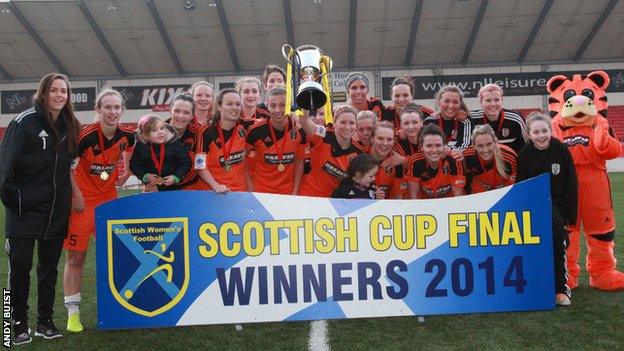
- Published7 September 2014
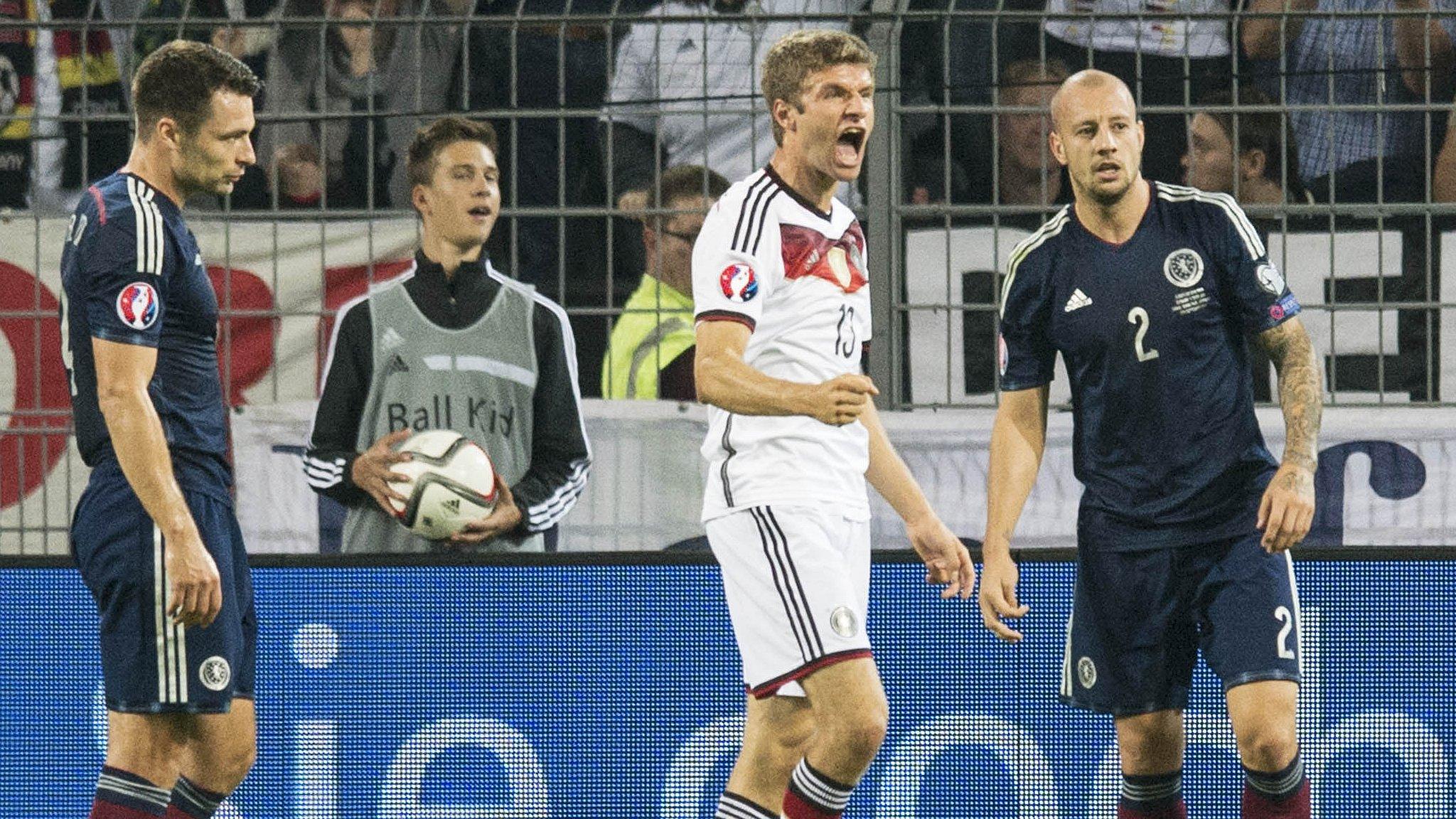
- Published6 June 2014
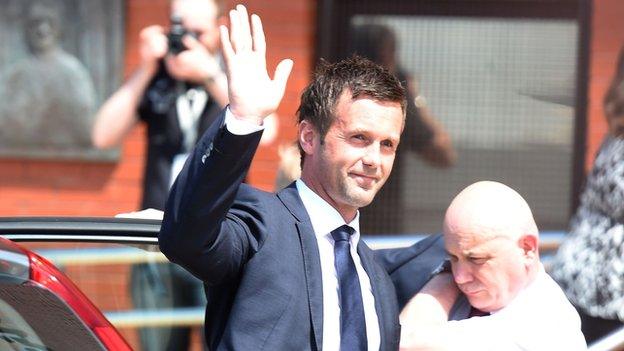
- Published25 May 2014

- Published17 May 2014
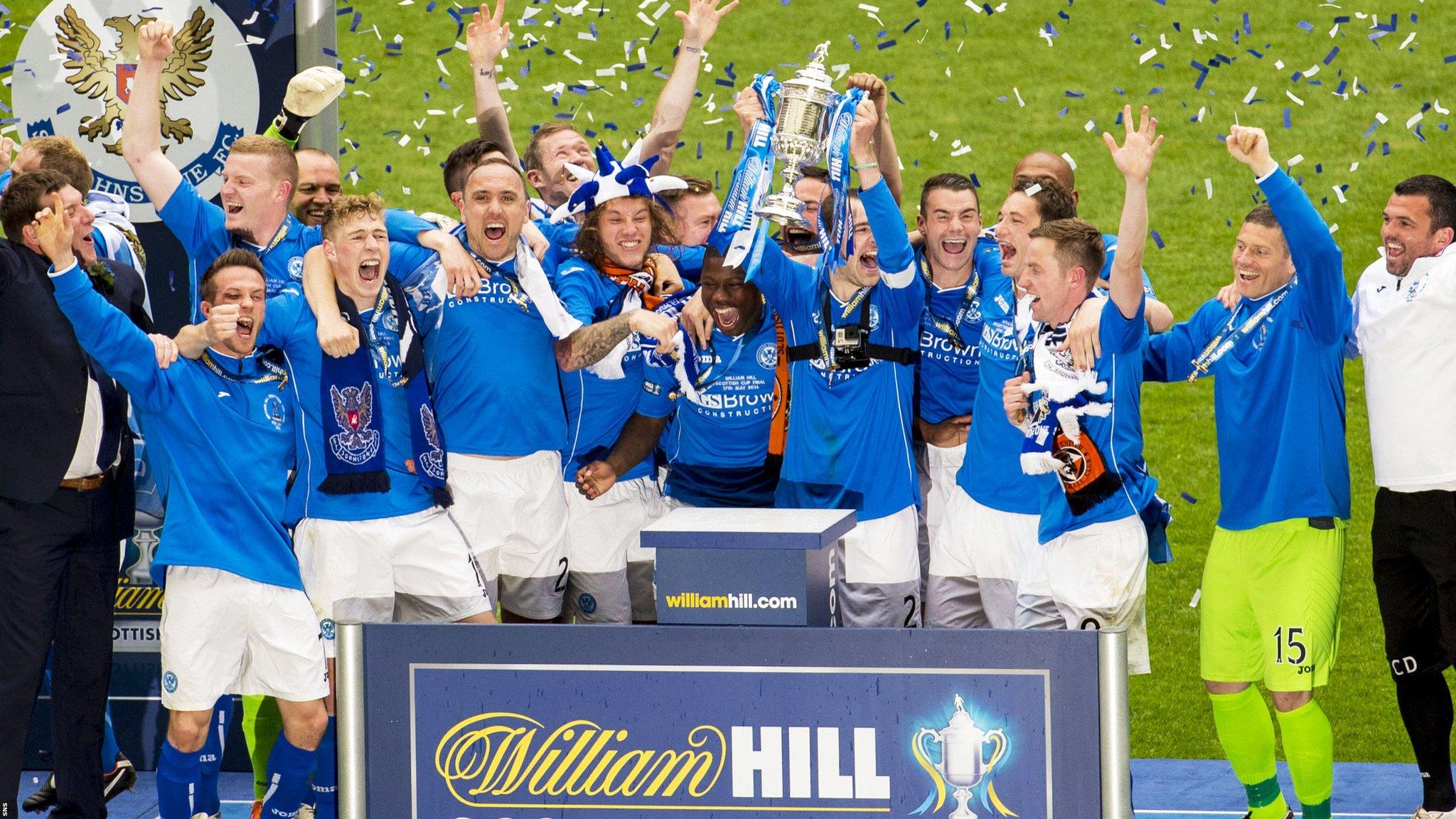
- Published6 April 2014
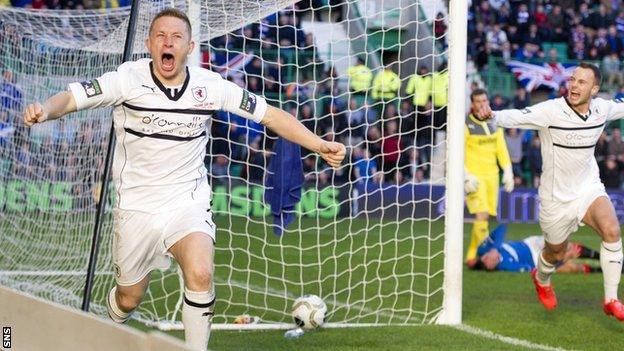
- Published16 March 2014
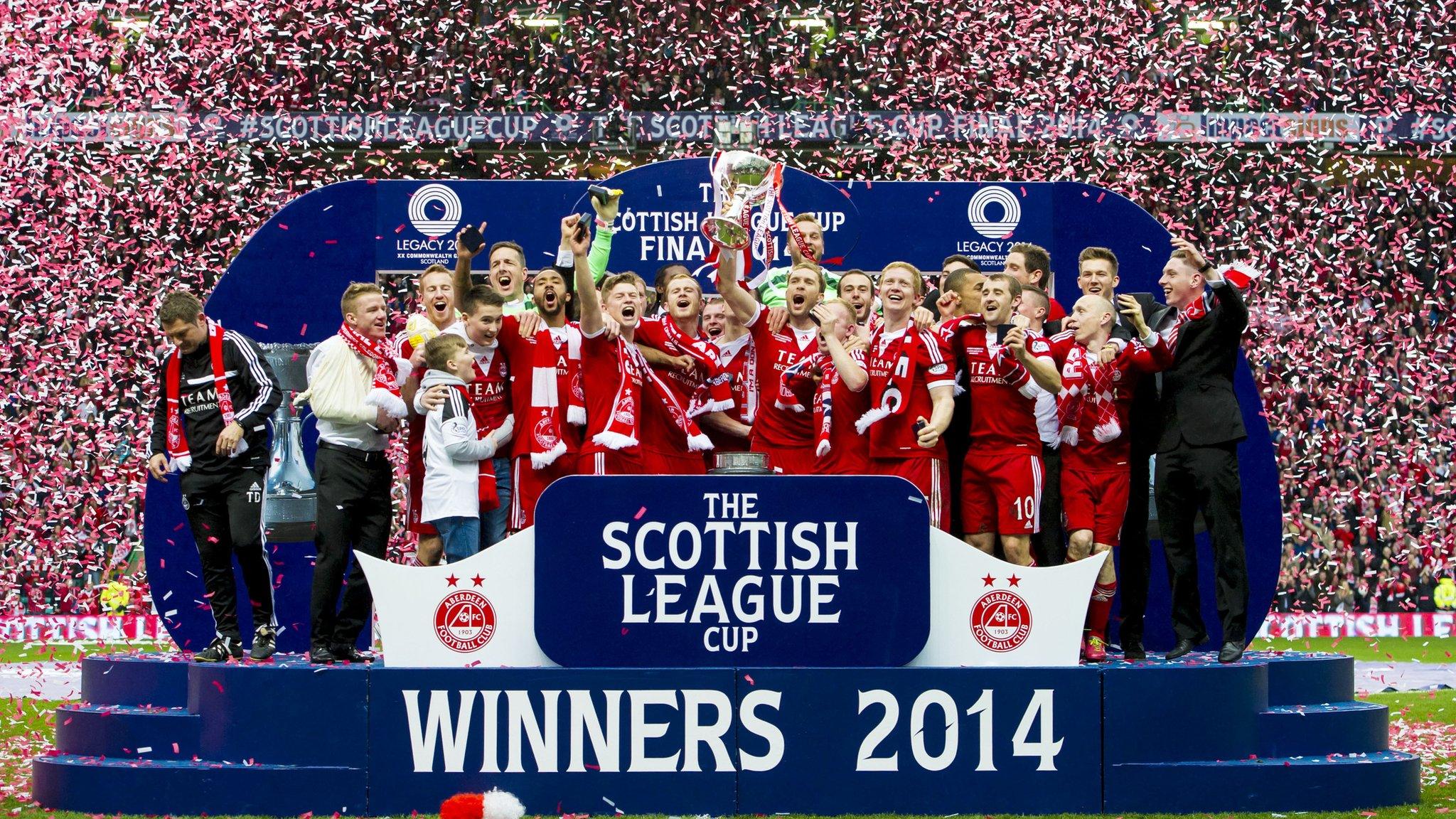
- Published20 June 2016

- Published7 June 2019

- Published2 November 2018
